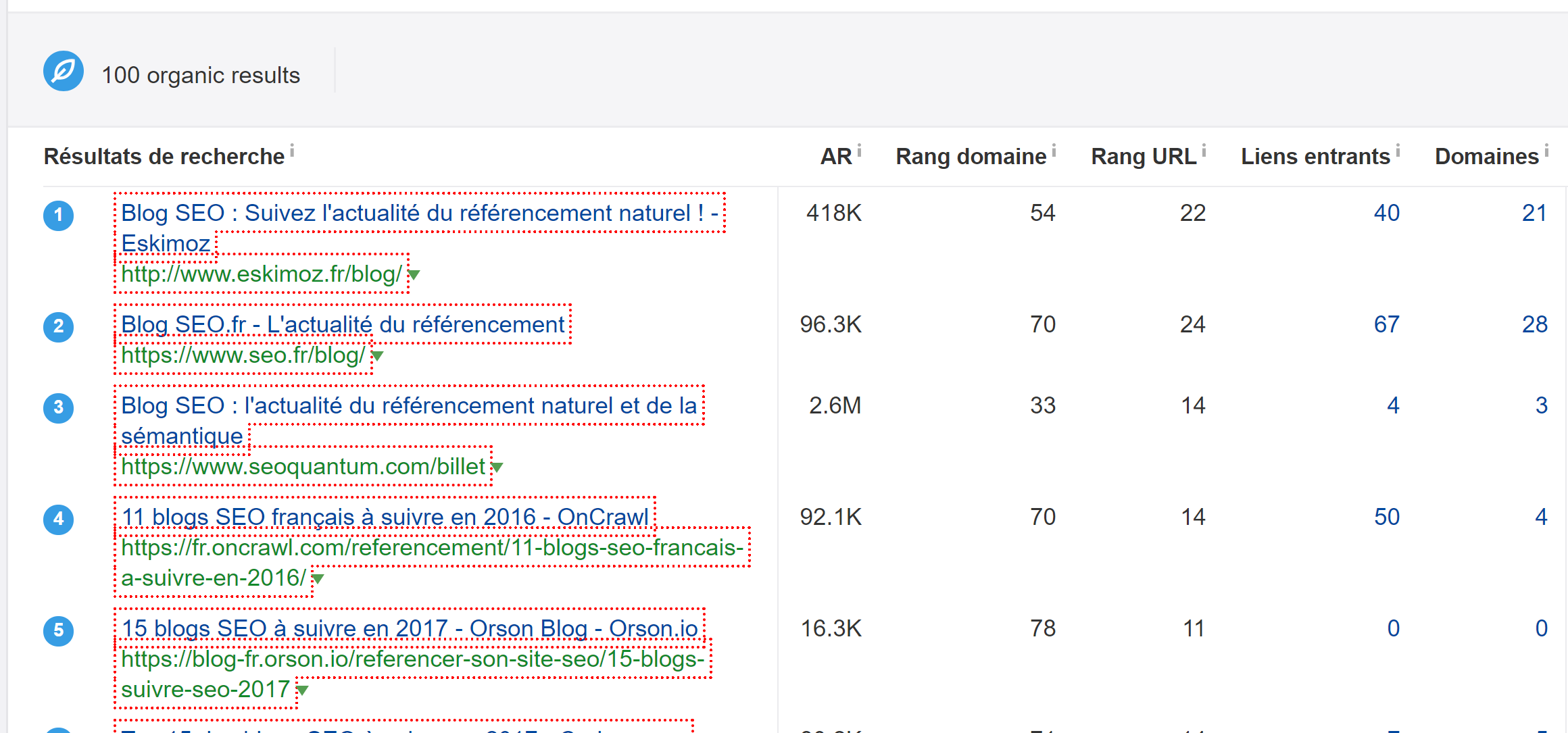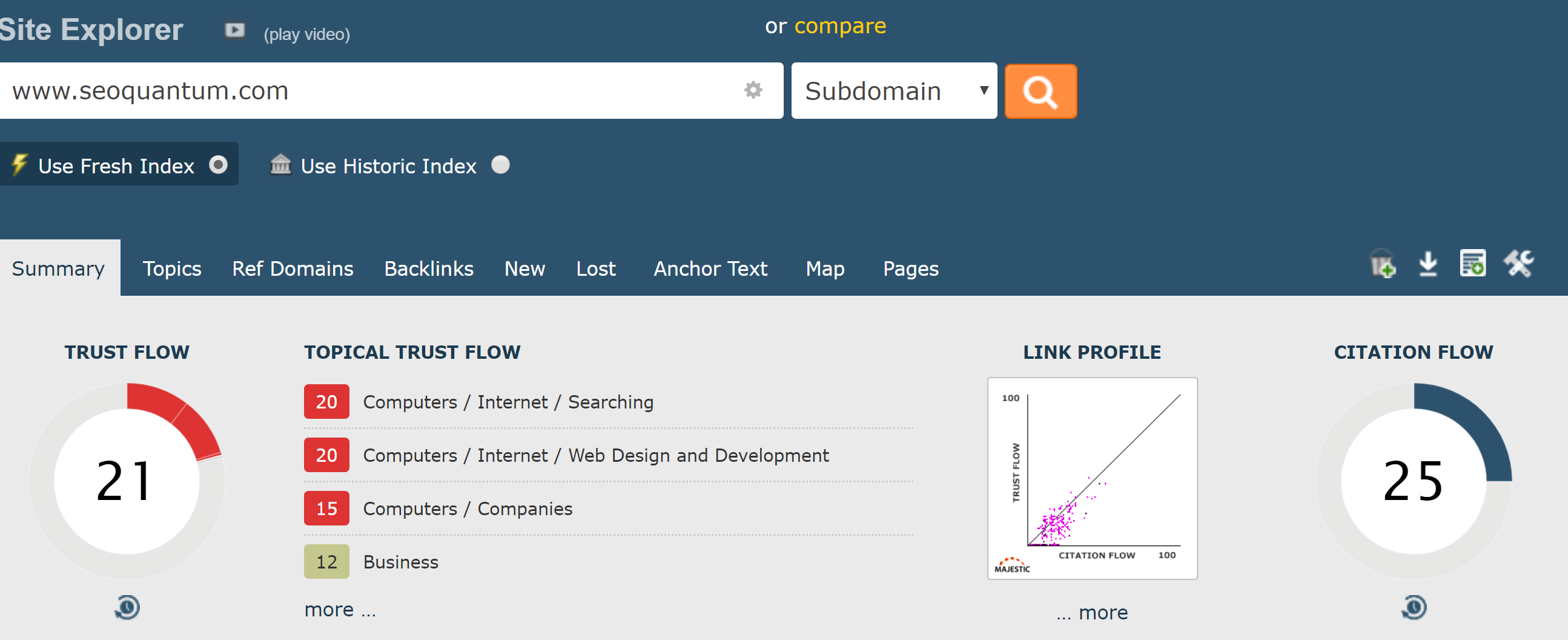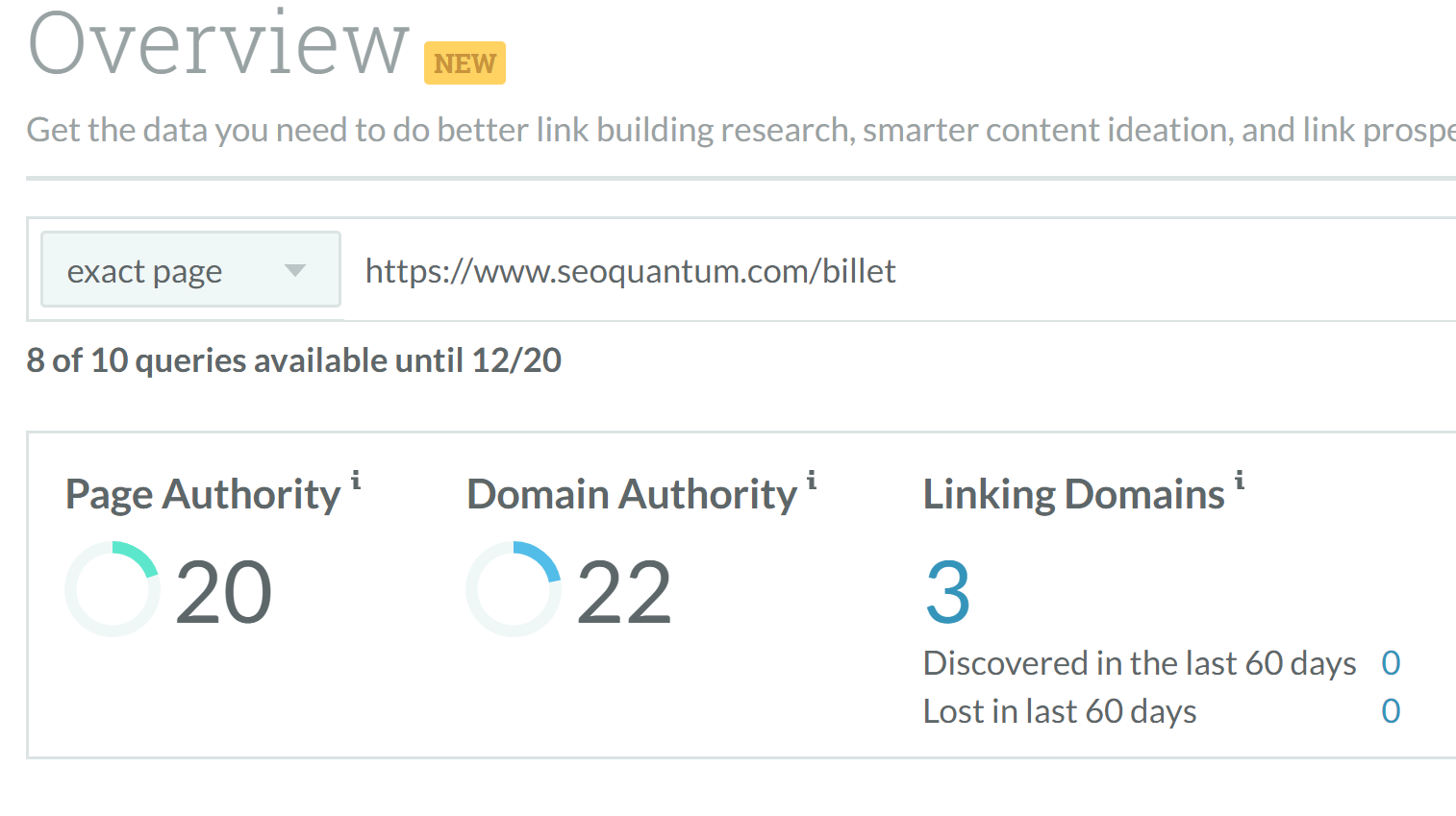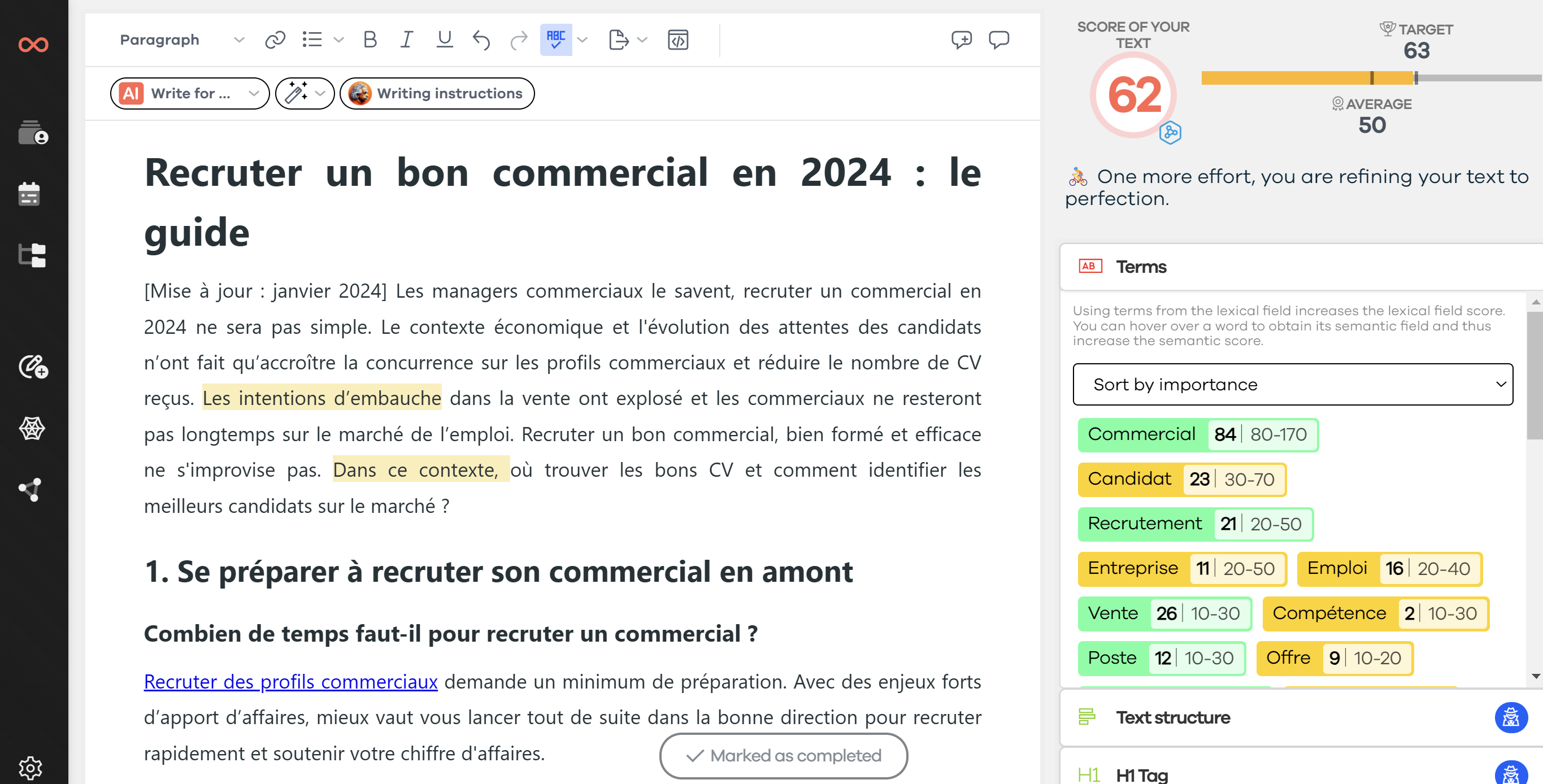Choosing keywords is undoubtedly the most important aspect of your SEO strategy. It helps guide the writing of your content, the way you approach your audience, and your overall content strategy.
Many non-experts are not familiar enough with this type of method. They know enough to attempt a strategy that often proves fruitless.
This research phase could be simplified, and many SEO novices perceive it as complex.
SEO keyword selection refers to finding the words and phrases that users employ when searching for information. It also involves determining the search volume related to these expressions and the level of competition. Keyword research is not a single step or action but a process where all steps are interconnected. To learn more, consult the complete guide on SEO keyword research.
This article is a continuation of the guide, with the goal of addressing the analysis and cleaning phase of the keyword list based on four aspects: the message you want to convey, the search intent of the user, the objective perceived by the search engine, and the SEO competition.
🤴 The 4 effective techniques that influence the choice of SEO keywords
As mentioned earlier, you should focus on 4 techniques to make the right choice of keywords in SEO. It's certain that if you neglect one of these aspects, your keyword strategy will not be relevant!

1. Choose keywords that represent you
The choice of words must be representative of your business and the message you want to convey. You are looking for relevant terms that will integrate seamlessly into your website. To achieve this, start by brainstorming and writing down all the keywords related to your field. Be careful not to include overly technical vocabulary, unless you are targeting B2B in a very specific domain.
Once this work is done, you can start grouping all these keywords in an Excel file. This will be the main basis for your website's structure. Based on this document, you will be able to define the different keyword clusters to ensure you cover all the semantics related to the topics you address.
2. Choose keywords that respond to your customers' search intent
Next, you need to understand your target customer and imagine which relevant keywords will match their search terms. To do this, draw inspiration from the vocabulary they use when communicating with you. This will satisfy their search intent, bringing you qualified traffic. I remind you that this is a fundamental aspect of your SEO strategy.
By following this step, you use the keywords your buyer persona uses and can then offer quality content on relevant queries. This is the best way to satisfy your customers and boost your revenue. Add the selected terms to the Excel sheet you started in the previous step.
3. Choose keywords that meet search engine expectations
Now that you know the expectations of your typical customers and have listed the keywords that represent your philosophy, you will focus on the expectations of search engines. To write content in accordance, you will analyze the first page of Google for each keyword. This will help you understand what type of content you need to write for each key query. We can differentiate three types of results:
- Informational: answers "how" and "why" questions, provides step-by-step guides, or gives precise definitions.
- Commercial: helps make choices by offering solutions, product comparisons, or reviews.
- Transactional: allows selling a product by informing about price, ordering, or availability.
In your Excel list, add this information next to each keyword to effectively guide your content writing. By doing so, you significantly increase your chances of appearing at the top of the SERP.
4. Choose keywords based on SEO competition
To discover other keywords and determine if you have a chance to rank among the top results, you will then perform a thorough analysis of your SEO competition. To start, you will likely find new keywords that you hadn't thought of. Next, you will learn about high-competition search terms. These will likely need work but may not be your top priority.
Quick tip: General queries (e.g., car) are often very difficult to properly position your website.
You now have a detailed list of all the interesting words for writing your website or blog content. But are they relevant from an SEO perspective? Is this keyword repertoire sufficient for good organic ranking? Read on to find the answers to these questions!
🔑 How to choose the right keywords for SEO?
Choosing keywords for SEO is of great importance. Most articles on keyword research only mention finding ideas and knowing search volume. This is problematic because they overlook an important aspect of research: how search engines understand keywords.

Search volume is not your priority for choosing keywords
I often hear website owners wanting to rank only on high search volume keywords. The fact is they neglect an essential aspect of SEO: if you write quality content by expanding your lexical field, your page will be ranked on a large number of keywords. For example, if you target only one keyword searched 500 times per month, you won't get the same traffic as if your article is on the first page of Google for 100 queries with only 10 monthly searches.
On the other hand, competition is fierce for keywords and phrases that are heavily searched. And ultimately, you take a significant risk by placing yourself on just one keyword. If your URL disappears from the first page of search results, you will have no organic traffic. So even if you optimize your page for an important keyword, don't neglect the number of associated keywords!
Choose a primary keyword
The primary keyword will be the core of your page. It must primarily address the search intent of users. By performing your preliminary work (keywords based on your business, customers, Google, and competition), you already have a good idea of which key queries you will work on. You can also prioritize them based on their SEO difficulty and your business objectives.
If you are creating your website, this is an excellent source of information for creating your topic cluster. If your site is already online, this keyword list will guide you in updating your content and feeding your blog in a relevant way.
Find secondary keywords
By using as many synonyms as possible and expanding your lexical field, you will have two advantages: you will please your reader and meet the requirements of search engine algorithms. Moreover, you increase your chances of positioning your content on numerous associated queries. This is the best way to increase your visibility on Google and skyrocket your traffic! To find secondary keywords, you can use several methods:
- Related searches on Google: when you search on Google, you get suggestions for searches related to your keyword. These can be questions related to the theme or the use of synonyms.
- Analyze your competition's lexical field: if you don't want to spend too much time on this task, focus mainly on the main title (and meta-title), introduction, bold words, and subtitles.
- Use an online tool: tools like SEMRush, Ubersuggest, or Ranxplorer allow you to quickly find a large number of secondary keywords that you can use to optimize your content.
Search for long-tail keywords
The long-tail is arguably the most effective way to attract qualified traffic and increase your conversion rate. You can combine keywords or use long key phrases to reach an extremely targeted audience. Don't be discouraged by the low search volume of this type of query, as they are very effective and allow you to differentiate yourself from your competition.
The long-tail keyword research method is similar to the one proposed for finding secondary keywords. However, you can truly let your intuition and creativity run free, as they are often unique. Put yourself in the shoes of the reader you want to attract to your site and try to reproduce their vocabulary when searching on Google.
⚗️ Does Google understand your keyword well?
Google has to deal with many nuances in search queries. For example, the term "plumbing" can be used to find a plumber, buy plumbing supplies, or learn about the history of plumbing. Google displays the type of sites it thinks are most relevant for this keyword. So, avoid using terms that seem relevant to you if Google attributes a different meaning to them. We are talking about hidden search intent for keywords.
For example, if you work for an architectural firm, you might choose the term "office" for the design of the room. However, this is not a good idea, as this term is mainly used by Google for pages about office furniture.

Search your keywords on Google. Analyze the top 10 results. What sites appear? Do they correspond to the intent of your keyword? Are they commercial sites, blogs, government sites, job sites? Would your site stand out if it appeared in the top 10?
You are more likely to rank well on a keyword if the other sites are part of your industry. If you have a health-focused site, the keyword "AMELI" has a high difficulty level because 8 out of 10 websites are government or CPAM sites.
If you choose to use it anyway, avoid building your keyword strategy around it, as Google favors government sites.
⚔️ Am I capable of facing competitors on this keyword?
Google takes into account over 200 SEO factors when deciding on the ranking of pages for a specific request. One of the most important factors is "authority." This refers to a site's reputation. This topic is quite complex, but in short, Google prefers well-known sites like Le Monde, Wikipedia, or Amazon to small, unknown websites.
Your goal is to choose expressions on which you can be present, as the competition is not too high. Imagine that you are a young actor (theater or cinema). You will try to gain some experience to have the opportunity to impress some spectators.
You could try auditioning for the latest Tarantino or Jacques Audiard film. If you get the part, you will have the chance to perform in front of millions of people. The problem is that you will only have a supporting role or, worse, be a mere extra.
It is wiser to join a local theater troupe and get stage time. You will impress fewer people, but they will be genuinely interested in your performance. You will play in front of a larger audience eventually, but later.
In short... to choose and prioritize your keyword list, you must know the intensity level of the competition from the standpoint of their authority.
Companies like MajesticSEO, Semrush, Ahrefs, and Moz have software that allows you to identify the competition level of a keyword. Some of these tools are free, and others are paid.
🚨 TOP tools for analyzing keyword competition
Your simple instinct is not enough to analyze a keyword's SEO competition. Of course, if you always find the same competitors at the top of search engine results pages, this is a good indicator. However, this technique is not precise enough and is very time-consuming. That's why I offer you a list of tools (paid and free) below that allow you to speed up your analysis work and refine your results.
Ahrefs (paid)
Visit Ahrefs.com to find out the Domain Rating (DR) of your domain name or enter the desired keyword to perform a SERP analysis.

Ahrefs Rank (AR)
If you sort all the websites in the world according to the power of their links/backlinks, you get the Ahrefs Rank (AR).
Thus, AR No. 1 belongs to the website with the most powerful backlink profile (Facebook.com), No. 2 to Twitter.com, No. 3 to YouTube.com, etc.
Domain Rating (DR)
Domain Rating (DR) indicates the relative "backlink popularity" of the website compared to all other websites in Ahrefs' database on a logarithmic scale of 100 points (the strongest).
MajesticSEO (paid)
Visit majestic.com to find out the trust flow (authority) of your domain name. Download the Majestic extension for Google Chrome or Firefox, which allows you to know the authority of the domain name of each site you visit.
Majestic's unique feature? The tool has an analysis and measurement tool for the theme (topical) of a site or web page called Topical TrustFlow. Each link from each site on the web transmits authority and a theme by cascade effect. This is a very useful indication to judge the relevance of a site in a specific theme.

Here, Seoquantum.com has a Topical TrustFlow mainly on "Computers/Internet/Searching," which perfectly matches my theme (SEO).
Moz (free)
I often use this tool because it integrates a browser plugin and is free, very practical. Discover your domain's authority by downloading (for free) MozBar for browsers. You can also enter your site's address on Open Site Explorer (via Moz).

Now that you have an idea of your website's score, perform a search in the browser. Your MozBar extension should be activated.
Under each search result, you will see two numbers: one for page authority and one for domain authority.

Are the domain authorities too high for you? Is the search results page taken by well-known brands and sites?
If there are many high-scoring sites among the results, are the displayed pages helpful?
If you were genuinely searching for this keyword, would you be interested in the results? Often, when Google cannot provide a good answer, it chooses the least "off-topic" content from a high-authority site.
However, if many genuinely useful articles written by well-known brands and sites are part of the results, I advise against using this expression.

And, as you can see from this search, you will never rank well on the term "iPhone."
Use this information to modify your keyword list. Avoid using keywords when your chances are very low. See this as an opportunity to be more precise.
Much of this process relies on your judgment. It takes practice to make the right decisions and to know your chances well. In fact, even natural SEO professionals sometimes struggle with keyword research. Remember, the best is the enemy of the good.
Follow these steps, and you will have an advantage over your competitors. It will also give you a better idea of your own site's level and help you refine your content strategy.
Summary for choosing SEO keywords
When researching and analyzing keywords for your Google SEO, it's easy to go astray or procrastinate. Be sure to check each step thoroughly.
1. Organize your keywords by topic
This way, you will use the keywords on your site in an organized manner. Writing a single keyword list is a good start, but try to create multiple related keyword lists quickly.
2. Don't lose sight of your website
Keyword research should be done as part of creating your content pages. Ask yourself the following question: are the keywords I found really suitable for my site? Is your site a good answer to the questions and keywords? Remember that to target keywords, you need to use them on your site.
3. Don't lose sight of search intent
It often happens that the meaning Google attributes to a keyword is different. You should notice this during the research process, but remain vigilant. For example, keywords composed of an industry name + the term "ads" are mainly used by people looking for job offers.
Google is not always able to understand this type of nuance. Keep this in mind when choosing your keywords.
Need to go further?
If you need to delve deeper into the topic, the editorial team recommends the following 5 contents:

